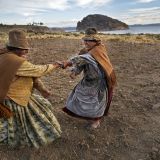Renée C. Byer
Living on a Dollar a Day
General Guisan Quai
The Lives and Faces of the World’s Poor’: This project is a compelling and extraordinary series of photographs and profiles by Pulitzer Prize-winning photojournalist Renée
C. Byer, whose work illuminates the human faces of people who live in extreme poverty around the world. Travelling to 10 countries on four continents, Byer sought out individuals and families on the brink of survival – living on about one U.S. dollar each day.
The people in Byer’s compelling profiles share their hardships, their joys, and their dreams for the future with her. Often with little hope of changing their destiny, they dream of something better for their children. In her searing and tender images, accompanied by stories shared by people whose trust she gained, Byer gives voice to those who would not otherwise be heard.
This exhibition, based on a book of same name, works to establish an interface through images and storytelling, to pull the viewer in and share a very personal experience which impacts us all, both abroad as well as at home. The exhibition ‘Living On A Dollar A Day’ was created to generate understanding, empathy and the ability to act in a positive way to end extreme poverty.
Renée C. Byer is best known for her in-depth work focusing on the disadvantaged. Her ability to produce photographs with profound emotional resonance and sensitivity earned her the Pulitzer Prize for feature photography in 2007 and dozens of national and international honours, including the World Understanding Award from Pictures of the Year International, and being a Pulitzer Finalist in 2013. Her multimedia work has been recognised through two Emmy nominations. Her images and interviews of her have been published in media outlets worldwide including Paris Match, TIME, Newsweek and National Geographic. Her photographs have been featured in 14 books and two monographs.
Curated by Lois Lammerhuber / Printed by ![]()
Discover here contributions of ETH Zurich to the Sustainable Development Goal (SDG) 1:
Better cooperation for ending extreme poverty
Fritz Brugger
Dr. Fritz Brugger’s professional and academic life is distinguished by an exceptional contribution to international cooperation and the development of social enterprises in Africa.
Shaping sustainability
His research investigates the impact that our increased consumption of gold, copper, lithium and other raw materials has on people living around mining areas. Fritz examines whether the current due diligence obligations carried out by industry are sufficient to protect health and the environment. His work also explores what the rules for cross-border investments should look like if low-income countries are to participate equally in global value chains without disregarding workers‘ rights, violating human rights or harming the environment.
In addition to his research, Fritz co-heads the Center for Development and Cooperation (NADEL) at ETH Zurich. The aim of the centre is to train future leaders in global cooperation on achieving the SDGs. So far, NADEL has trained over 1500 people.
1.90 per day
As the host of the centre’s podcast series ’1.90 a day’, Fritz discusses the future of international cooperation with NADEL alumni, asking how their work contributes to ending extreme poverty, achieving gender equality or reducing unsustainable consumption.
The name of the podcast refers to the extreme poverty threshold in place until last year, when it was revised up to US$2.15 per person per day. The number of people living in extreme poverty has halved in the last two decades. This is very encouraging, but should not overshadow the scale of global poverty that remains: almost five billion people are getting by on less than US$10 a day.
The podcast conversations reveal how multi-layered a challenge it is to overcome poverty and inequality, shedding light on the complex quest for a sustainable future.
“Almost everything we buy, consume, use or own connects us directly or indirectly with people in low-income countries. I was interested in this global connection, and how the rules of the game between the ‘Global North’ and the ‘Global South’ are shaped. Because sustainability, reduced poverty and equality can only be thought of and achieved globally”
Dr. Fritz Brugger, Executive Director of the Center for Development and Cooperation (NADEL) at ETH Zurich
Innovating our way out of poverty
Isabel Günther
For more than 15 years, Professor Isabel Günther has been researching and teaching on global poverty and inequality. Originally trained at the University of Göttingen in Germany, she has conducted research in Ethiopia, Benin, Burkina Faso, France, Ghana, Kenya, Switzerland, South Africa, Uganda, and the USA.
Since 2014, she has been academic director of the NADEL Center for Development and Cooperation at ETH Zürich, which educates students as well as professionals from NGOs, public administration and the private sector on global cooperation for sustainable and equitable development. In 2019, Isabel Günther co-founded the ETH for Development ETH4D network to drive progress on technological innovations that promise to improve the lives of the 60% of the global population who live on less than US$10 a day.
Global poverty and its many dimensions
In her research, Isabel focuses on how local and global economic policies can improve the living conditions of people who have to get by on a low income. Global poverty has many dimensions. In line with this, the research questions are diverse, covering topics that range from health care to decent work to solar energy.
How can we design health insurance that benefits the poorest population groups in society? How can poor people in densely populated cities protect themselves from pandemics like Covid-19? What measures are effective to stop child labour on cocoa plantations? How does the extraction of raw materials affect living conditions of people who live in mining countries? What can new technology, such as solar panels or mobile phones, contribute to poverty reduction? How do global social standards, such as fair trade, influence consumer behaviour in rich countries?
Everyone can help to reduce poverty
In public lectures, Isabel has heard time and time again that many people in Switzerland are keen to know more about global inequality and poverty, and want to take action themselves. Since 2021 she has been conducting a survey of 3,000 Swiss residents selected to represent views nationwide, asking about their attitudes to global poverty and international cooperation. Named the Swiss Panel Global Cooperation, this survey will be repeated annually until 2030.
According to the first results, Swiss citizens often care about global justice more than they do about Swiss economic interests. In 2021 there was wide support for efforts to intellectual property rights that restricted access to Covid-19 vaccines, for example, and for measures that require Swiss companies to closely monitor their supply chains. Across the Swiss population (young and old, urban and rural, men and women, rich and poor) there is strong support for an active role of Switzerland to fight global poverty. The results on the level of knowledge Swiss residents feel they have about global poverty signal an information gap: almost one third of the respondents stated that they do not feel well informed and would like to know more about poverty and global inequality. Almost 90% had not yet heard of, or knew very little about the SDGs and only 13% knew that global poverty has significantly decreased over the last 30 years.
“While 200 years ago an estimated 90% of the world’s population lived in extreme poverty, today 10% of the world’s population still lives in extreme poverty, meaning on less than US$2 per day – but in a world where the average income in the richest countries is over US$200 per day. The extreme global income inequalities on the one hand, and the great progress in poverty reduction over the last 30 years on the other hand, is what motivates me daily for my work.”
Prof. Dr. Isabel Günther, Head of NADEL Center for Development and Cooperation at ETH Zurich and Spokesperson of ETH4D
Leaders that champion innovation for all
Adina Rom
Dr. Adina Rom is passionate about international development economics. She lived in New York, San Francisco, Geneva and Zurich, before moving to rural Kenya at the age of 23. A new experience, life there never ceased to surprise her, and Adina realised how many false assumptions and prejudices about poverty had shaped her thinking up to that point. Irritated and inspired by this, she decided to dedicate her life to evidence-based poverty reduction.
Fighting poverty with research and technology
The proportion of people living in extreme poverty worldwide has halved in the past 20 years. Even so, about 800 million people still live on less than $US 2 per day and lack access to adequate food, safe drinking water, clean electricity, sustainable transport, and other basic services.
As executive director of the ETH for Development (ETH4D), a network of 50 professorships at ETH that are committed to further strengthen ETHs engagement for the UN Sustainable Development Goals (SDGs), Adina believes that universities have a responsibility to ensure that technological progress benefits the entire world population, not just the wealthiest societies.
The rapid development of mobile technology and solar energy, for example, has had a huge impact on business and society across the globe over the past decade. Technologies such as 3D printing, remote sensing and AI promise to advance development. ETH4D therefore supports research, which combines the knowledge and skills from different disciplines and promotes the collaboration between scientific research, civil society, industry and policy.
Education for a sustainable and equitable future
Next to supporting research and innovation projects, the initiative educates a new generation of engineers and scientists who can develop and implement innovations with a global perspective. Since 2022 it has offered a joint Master’s degree in engineering together with Ashesi University in Ghana, with faculty from both institutions teaching together on site. The initiative also offers summer schools where students jointly develop ideas for a sustainable future and creates a hub for topics related to global sustainable development at ETH Zurich by organising relevant lectures and events.
“If graduates understand equitable global development, they can make a big difference.”
Dr. Adina Rom, Executive Director of the ETH for Development (ETH4D) initiative
open your eyes festival buerau
Botenaustrasse 42
9443 Widnau
Switzerland
Phone: +41 44 218 11 03




